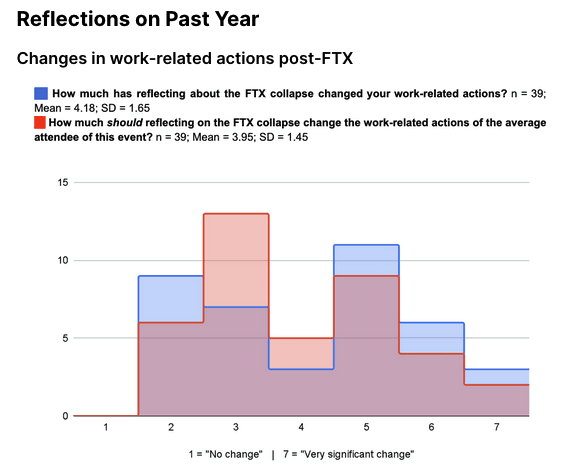A brief and belated update: When I resigned from the board of EV US last year, I was planning on writing about that decision. But I ultimately decided against doing that for a variety of reasons, including that it was very costly to me, and I believed it wouldn’t make a difference. However, I want to make it clear that I resigned last year due to significant disagreements with the board of EV and EA leadership, particularly concerning their actions leading up to and after the FTX crisis.
While I certainly support the boards’ decision to pay back the FTX estate, spin out the projects as separate organizations, and essentially disband EV, I continue to be worried that the EA community is not on track to learn the relevant lessons from its relationship with FTX. Two things that I think would help (though I am not planning to work on either myself):
- EA needs an investigation, done externally and shared publicly, on mistakes made in the EA community’s relationship with FTX.[1] I believe there were extensive and significant mistakes made which have not been addressed. (In particular, some EA leaders had warning signs about SBF that they ignored, and instead promoted him as a good person, tied the EA community to FTX, and then were uninterested in reforms or investigations after the fraud was revealed). These mistakes make me very concerned about the amount of harm EA might do in the future.
- EA also needs significantly more clarity on who, if anyone, “leads” EA and what they are responsible for. I agree with many of Will MacAskill’s points here and think confusion on this issue has indirectly resulted in a lot of harm.
CEA is a logical place to house both of these projects, though I also think leaders of other EA-affiliated orgs, attendees of the Meta Coordination Forum, and some people at Open Philanthropy would also be well-suited to do this work. I continue to be available to discuss my thoughts on why I left the board, or on EA’s response to FTX, individually as needed.
- ^
Although EV conducted a narrow investigation, the scope was far more limited than what I’m describing here, primarily pertaining to EV’s legal exposure, and most results were not shared publicly.


When I looked at past CC actions, I didn't get the impression that they were in the habit of blowing things out of proportion. But of course I didn't have the full facts of each investigation.
One reason I don't put much stock in the CC may not "necessarily [be a] trustworthy or fair arbiter" possibility is that it has to act with reasoning transparency because it is accountable to a public process. Its actions with substance (as opposed to issuing warnings) are reviewable in the UK courts, in proceedings where the charity -- a party with the right knowledge and incentives -- can call them out on dubious findings. The CC may not fear litigation in the same sense that a private entity might, but an agency's budget/resources don't generally go up because it is sued and agencies tend not to seek to create extra work for themselves for the thrill of it.
Moreover, the rationale of non-disclosure due to CC concerns operates at the margin. There are particular things we shouldn't disclose in public because the CC might badly misinterpret those statements is one thing. There is nothing else useful we can disclose because all of those statements pose an unacceptable risk of the CC badly misinterpreting any further detail is another.